After renovating your kitchen, its longevity and continued appeal hinge on meticulous maintenance. This includes daily cleaning to protect surfaces and prevent grime buildup, as well as periodic checks of plumbing and electrical systems. Different materials like sealants for stone countertops or moisture protection for wood finishes require specialized care to maintain their charm and functionality. A routine that encompasses cleaning, inspection, and material-specific maintenance ensures the kitchen's new appearance and optimal performance are preserved. Regular upkeep also protects your investment by keeping the space clean, functional, and aesthetically pleasing over time. Additionally, smart storage solutions should be integrated during renovations to maximize efficiency and organization. For moisture management, employ exhaust fans, dehumidifiers, and moisture-resistant materials, and inspect regularly for signs of mold. By addressing water ingress promptly and using mold-resistant products, you can maintain the kitchen's integrity against dampness, thus preserving its condition and enhancing your living space. Kitchen renovations should be planned with a focus on enduring design and moisture resistance to guarantee the kitchen remains a functional and beautiful part of your home for years to come.
Keeping your kitchen in prime condition post-renovation is both an art and a science. This article offers a comprehensive guide on maintenance tips that will help your renovated kitchen stay pristine for years to come. We’ll explore the necessity of daily upkeep, deep cleaning strategies, organizational hacks, and regular checks for appliances and fixtures to ensure longevity and prevent common issues like moisture-related damage. By adhering to these practices, your kitchen renovations will not only retain their new look but also function optimally.
- Understanding the Importance of Post-Renovation Maintenance in Your Newly Renovated Kitchen
- Daily Cleaning Routines to Preserve Your Kitchen's Fresh Look After Renovations
- Deep Cleaning and Disinfecting Strategies for Long-Term Kitchen Upkeep
- Organizational Tips to Keep Your Kitchen Spaces Efficient and Clutter-Free Post-Renovation
- Regular Maintenance Checks: Ensuring Appliances and Fixtures Stay in Peak Condition
- Dealing with Moisture and Preventing Mold Growth in Your Renovated Kitchen Environment
Understanding the Importance of Post-Renovation Maintenance in Your Newly Renovated Kitchen
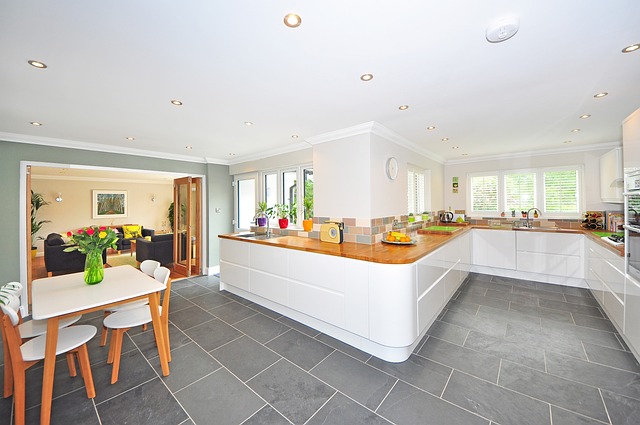
Post-renovation maintenance is a critical phase in preserving the pristine condition and longevity of your newly renovated kitchen. After investing in kitchen renovations, it’s imperative to adopt proactive care measures to safeguard your investment. The materials and appliances used in modern kitchen renovations are designed with durability in mind; however, their lifespan can be significantly extended with proper upkeep. This includes daily cleaning routines that protect surfaces from stains and scratches, as well as regular checks of plumbing and electrical systems to prevent leaks or shorts that could cause damage over time.
Furthermore, understanding the specific needs of each material in your kitchen, such as stone countertops requiring sealants or wood finishes needing protection from moisture, is crucial for maintaining their aesthetic appeal and functional integrity. Regular maintenance not only keeps your kitchen looking new but also ensures that it operates efficiently and safely. By adhering to a routine of cleaning, inspecting, and treating various components of the kitchen, you can maintain the freshness and quality of your kitchen renovations, ensuring they remain a hub of activity and enjoyment for years to come.
Daily Cleaning Routines to Preserve Your Kitchen's Fresh Look After Renovations
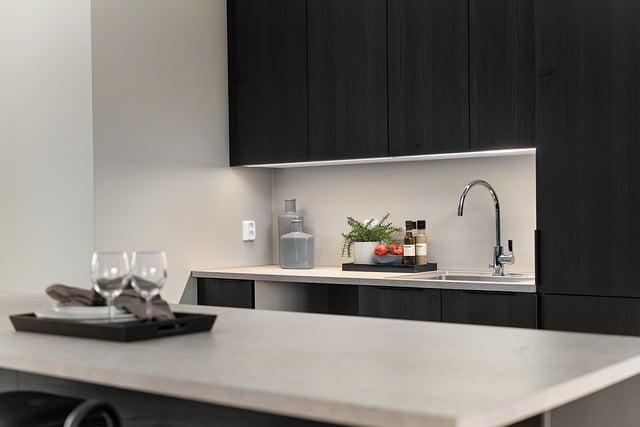
Following a kitchen renovation, preserving the fresh and polished look you’ve achieved is key to ensuring your investment remains a focal point of your home. Establishing daily cleaning routines tailored to your renovated space is essential for maintaining its luster. Start by wiping down countertops and appliance surfaces with a gentle, non-abrasive cleaner to remove smudges and fingerprints that accumulate throughout the day. This not only keeps surfaces hygienic but also prevents the buildup of grime that can mar the finish of your new quartz or granite counters.
Additionally, sinks and faucets should be addressed daily to prevent soap scum and water spots from settling. Invest in a stainless-steel cleaner for your appliances to maintain their shine and protect against water spots that can tarnish the metal over time. For your floors, a quick sweep or mop with a pH-neutral cleaner will remove crumbs and dirt, safeguarding your floors from scratches and stains. By integrating these simple maintenance practices into your daily routine, you’ll ensure that your kitchen renovations remain a pristine and inviting part of your home for years to come. Regular upkeep not only preserves the aesthetic appeal but also extends the lifespan of your kitchen’s features, making the most of your post-renovation space.
Deep Cleaning and Disinfecting Strategies for Long-Term Kitchen Upkeep
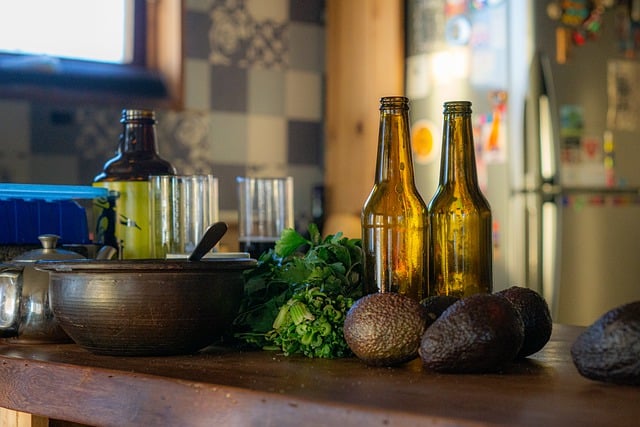
Following a kitchen renovation, maintaining the pristine condition of your new space is paramount to its longevity and appeal. Deep cleaning and thorough disinfecting are critical components of long-term kitchen upkeep. To start, focus on the appliances. Each unit, from the refrigerator to the oven, should be wiped down with a mild detergent and a soft cloth or sponge to remove any residue or fingerprints that can mar their surfaces over time. For more robust cleaning of stovetops and ovens, opt for specialized appliance cleaners or a mixture of baking soda and vinegar, which effectively tackle grease and grime without harming sensitive materials.
After addressing the appliances, direct your attention to the countertops and sink areas. These are hubs of kitchen activity and thus require regular cleaning. Granite, marble, and other stone surfaces can be maintained by regularly sealing them to prevent stains and etches. For daily cleaning, a mild soap solution will suffice. Glass and ceramic tile countertops benefit from a glass cleaner that won’t leave streaks or residue. Disinfecting the sink and faucets with antibacterial solutions, especially after food preparation, is crucial to prevent the spread of bacteria and ensure the health of your family. Remember to use products appropriate for the material of your sink, as some harsh chemicals can damage certain finishes. Regularly mopping the kitchen floor with a disinfectant solution will keep the entire space clean and hygienic. Implementing these deep cleaning and disinfecting strategies after your kitchen renovations will help preserve its new look and ensure it remains a functional, safe, and inviting part of your home for years to come.
Organizational Tips to Keep Your Kitchen Spaces Efficient and Clutter-Free Post-Renovation

After completing your kitchen renovations, maintaining an efficient and clutter-free space is crucial for preserving both the functionality and aesthetics of your newly designed kitchen. To ensure your kitchen remains organized and user-friendly post-renovation, consider implementing these organizational tips. Firstly, evaluate your storage solutions during the renovation planning phase to accommodate all your kitchenware. Utilize pull-out cabinets and drawer organizers to maximize space and keep items easily accessible. For instance, install a Lazy Susan in corner cabinets to access hard-to-reach areas with ease. Additionally, opt for open shelving for frequently used items like cooking oils, spices, and utensils, which can add a decorative touch while keeping them within arm’s reach. Ensure that each item has a designated spot, reducing the chances of clutter accumulation.
Moreover, consider implementing a kitchen island or peninsula with built-in storage to serve as both a work surface and additional space for seating. This design choice not only enhances the kitchen’s layout but also provides extra organization for appliances, cookbooks, or displaying decorative items. Regularly scheduled cleaning and decluttering sessions will help maintain the efficiency of your kitchen. For example, clear out your pantry monthly, wiping down shelves and reorganizing canned goods and dry ingredients to prevent spoilage and keep your space tidy. By thoughtfully planning your storage during the renovation phase and maintaining a routine of organization and upkeep, you’ll ensure that your kitchen stays both efficient and aesthetically pleasing for years to come. Remember to utilize kitchen renovations experts who can offer tailored solutions to fit your specific needs and lifestyle, ensuring the longevity and practicality of your kitchen space.
Regular Maintenance Checks: Ensuring Appliances and Fixtures Stay in Peak Condition
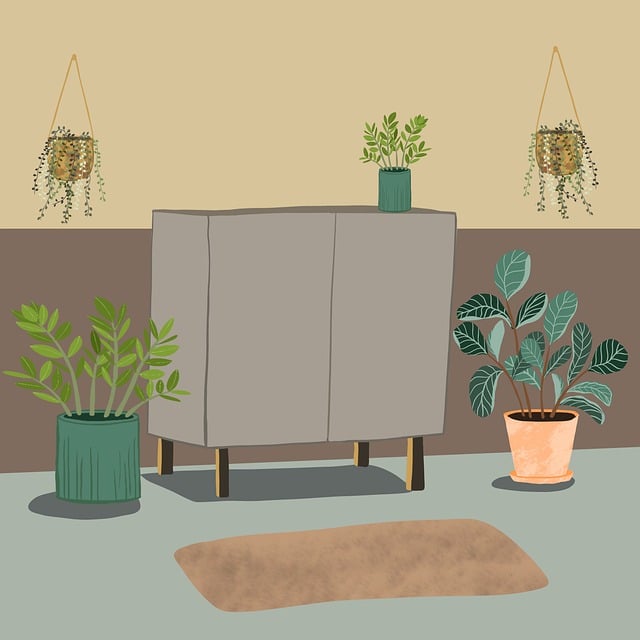
Following a kitchen renovation, maintaining the luster and functionality of your newly updated space is paramount to preserving its appeal over time. To ensure that your appliances and fixtures remain in peak condition, it’s crucial to establish a routine for regular maintenance checks. Begin by inspecting each appliance monthly. This includes checking seals on refrigerators and ovens, cleaning the coils underneath large appliances to maintain efficiency, and verifying that dishwashers and washing machines are draining properly. Tighten loose handles, and test all electrical components for proper function to prevent potential hazards.
For fixtures, such as faucets and lighting, regularly assess their performance. A dripping faucet or a weak bulb can quickly diminish the ambiance and efficiency of your kitchen. Address minor issues promptly by replacing washers, cleaning filters, and changing out bulbs for energy-efficient options. Additionally, polishing hardware, like cabinet pulls and knobs, not only enhances their appearance but also confirms their secure attachment. By incorporating these maintenance tasks into your routine, you can extend the life of your kitchen renovations and keep them looking as new as the day they were completed.
Dealing with Moisture and Preventing Mold Growth in Your Renovated Kitchen Environment
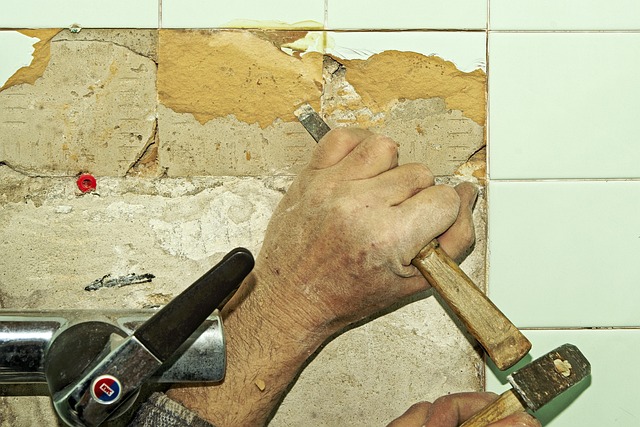
After undergoing a kitchen renovation, maintaining a pristine environment is crucial to ensure your investment remains in top condition, particularly when it comes to moisture management and preventing mold growth. Moisture can be a persistent issue in kitchens, especially if there’s poor ventilation or high humidity levels. To effectively manage this, employing exhaust fans during cooking and using a dehumidifier in damp conditions can significantly reduce excess moisture in the air. These appliances work by removing water vapor from the environment, thereby preventing condensation on surfaces where mold could take hold.
Regularly inspecting your kitchen for signs of mold is a proactive step in kitchen maintenance post-renovation. Mold thrives in moist, warm environments, so it’s essential to address any leaks or spills promptly. Kitchen Renovations should include proper sealing of surfaces, especially around sinks and dishwashers, to mitigate the risk. Additionally, using mold-resistant paint and materials during renovation can provide an extra layer of defense. Cleaning grout lines, seals, and countertops with a bleach solution or specialized cleaner will also help in keeping these areas mold-free. By staying vigilant and implementing these strategies, you can protect your newly renovated kitchen from the damaging effects of moisture and mold growth, ensuring it retains its fresh, new look for years to come.
Following a kitchen renovation, preserving its pristine condition requires diligent maintenance. This article has outlined key practices for daily cleaning, deep disinfection, organizational efficiency, and regular checks on appliances and fixtures to ensure your kitchen not only maintains but enhances the fresh look achieved through your investment in kitchen renovations. By understanding the importance of post-renovation care and implementing these strategies, you can prevent common issues like moisture damage and mold growth, thereby extending the lifespan and beauty of your newly refreshed space. Remember, the secret to a kitchen that remains both functional and aesthetically pleasing lies in consistent upkeep. With these maintenance tips, your kitchen renovations will continue to be a standout feature of your home for years to come.
